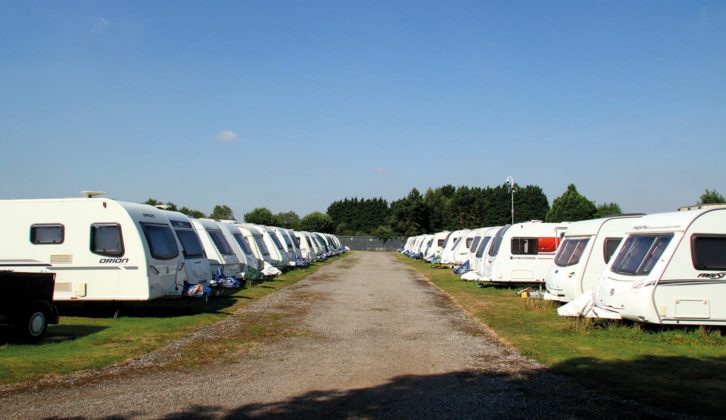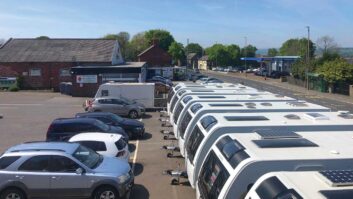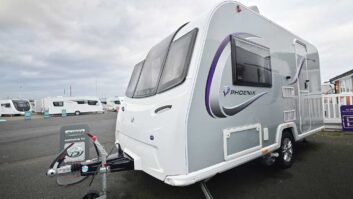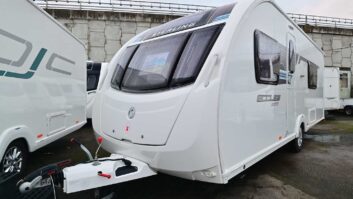When the tracking company rang caravan owner Elaine Meers one night last October, to say there had been a power outage in the van she and her husband Steve kept in a storage depot, and which was fitted with a GPS tracking system, she thought nothing of it.
It was a 10.45pm, and she thought that this was almost certainly just a brief quirk in the system. She thanked the operator, put the phone down, and went to bed.
Had the operator explained to her that a power outage is very often the first sign of someone trying to get into the van (something she only found out months later, ironically enough in a newsletter that the company sent her), she might at least have gone to check that all was well with the van.
She could see their van from the top of her drive, because it was stored just a few hundred yards away from her home in Burntwood, Staffordshire.
Like many caravanners, the Meers don’t like to keep the van outside their house, because it then becomes an indicator to any passing would-be burglar that the family is away.
But this caravan was stored behind a locked gate, and the depot it was in was so small, inconspicuous and minimally signposted, few people knew it was even there. Surely it would be fine, wouldn’t it?
Sadly, no. The next morning, the depot’s owner rang to tell Elaine that her prized caravan, a twin-axle Sterling Eccles from 2017 – the first of half a dozen tourers the family has owned over the years that they had bought brand new – had been stolen during the night.
Breaking in
There was nothing wrong with the gates – they had remained shut. The thieves had got in by finding a hole in the fence at the other end of the field, breaking in, and then towing the caravan off-road for at least half a mile to reach another road.
But none of this activity had been recorded on the tracking system, one of the first things the thieves wrenched off the van. They had left it behind.
So you might think this is a sad tale of total loss, a shocking reminder of criminal Britain. Well, no, actually.
In January this year, Elaine had a call out of the blue from PC John Hutchings, of the Northamptonshire Police.
The Eccles had been found, he told her, as part of a separate police investigation into stolen property. “We knew that they would possibly have taken the van some way away, because we live less than a mile from the M6 Toll,” Elaine says.
Sadly it was damaged, and not just from the initial rough treatment it had received. The thieves had also ripped out the crockery racks, shrink-wrapped the bedding, and very possibly sold the vehicle on.
So far nobody has been charged with theft, because the police could not prove that the people who were using the caravan when it was recovered were even aware that it was stolen. But Elaine knew her pride and joy would now be coming back to her.
So how was this achieved? Simple: the caravan had been fitted, even before it left the factory, with a radio-frequency identification (RFID) chip embedded in its structure.
Chip and VIN
The VIN CHIP (vehicle identification number chip) is part of the CRiS registration scheme, which is celebrating its 30th birthday this year.
The scheme, run on behalf of the National Caravan Council (NCC), issues each caravan with a unique 17-digit registration code that’s recorded on a central CRiS database. Initially, these were stamped on the chassis and, using a tamper-evident security label, on the van’s windows. CRiS operations director Kelly Surtees says the latter position was agreed right from the start of the scheme, back in 1992.
“It was seen as important that the consumer was able to see a VIN mark,” she says.
The idea with the chassis mark was that anyone searching for a stolen van, or looking to buy a used tourer, could check the vehicle’s ownership, even if the windows had been replaced.
The CRiS operation was initially outsourced, but when it came in-house in 2013, it was further expanded, with the introduction of the VIN CHIP, which proved so useful in the recovery of Elaine’s caravan.
The far more secure RFID chip, hidden in an undisclosed location within the caravan, allows anyone with an RFID reader to access the VIN number quickly and easily.
A QR code in the gas bottle locker gives you access, too, but the chip itself is hidden.
Since 2016, the system has become an industry standard, with a VIN CHIP in almost every new caravan produced in the UK. As the scheme has joined Secured by Design, an official police security initiative, it has been used by police forces around the country, although no figures have yet been produced to show how many vehicles have been recovered.
“Police and law enforcement agencies work closely with VIN CHIP, and even if criminals seek to reidentify the vehicle, the RFID chip will still reveal its true identity,’ says Kelly.
CRiS Registration
Given that all new tourers should have a VIN CHIP, as an owner, you probably don’t need to do too much about your own chip except to understand why it is there and how it works.
But the system really comes into its own if you decide to buy a used caravan. Then you can go to the CRiS website and, for £13.95 each time, check everything you need to know about the vehicle.
This allows you not only to confirm it hasn’t been stolen, but also to check it hasn’t been written off before, and that there are no outstanding financial constraints on it.
Kelly also points out that many insurance companies will want to see the CRiS registration document related to the vehicle before they process a claim. So you need to make sure that you are given this when you buy your caravan, and keep it safe.
If you happen to own a van that is not currently graced with the VIN CHIP system, all is not lost: you can have a chip retrofitted.
Again, via the CRiS website, the VIN CHIP Pack costs £36.99 for caravans built before 2016, or you can get the enhanced VIN CHIP PLUS Pack, which is suitable for all model years.
Background check
What impressed Elaine most about the system was how it operates in the background. “PC Hutchings wasn’t looking for our van, he was following up stolen industrial plant. But he still managed to scan our caravan and find it!” she says.
Sadly, Elaine’s tribulations are not over quite yet. She is currently in dispute with her insurance company, which has voided her claim for repairs on the van because of a misunderstanding about whether the gates to the storage depot were locked all the time, even though in this case, the thieves actually made no use of them.
But she says that having the caravan back has been a great relief. It has been cost-effective, too, especially in comparison to other security measures that might reduce your premium slightly, but involve an annual cost. CRiS registration for caravans, she thinks, is simply providing peace of mind.
If you liked this, why not read these:
- We take a look at the best small caravans
- We talk you through all you could need to know about storing a caravan
If you’ve enjoyed reading our guides, why not get the latest news, reviews and features delivered direct to your door or inbox every month. Take advantage of our brilliant Practical Caravan magazine SUBSCRIBERS’ OFFER and SIGN UP TO OUR NEWSLETTER for regular weekly updates on all things caravan related.









